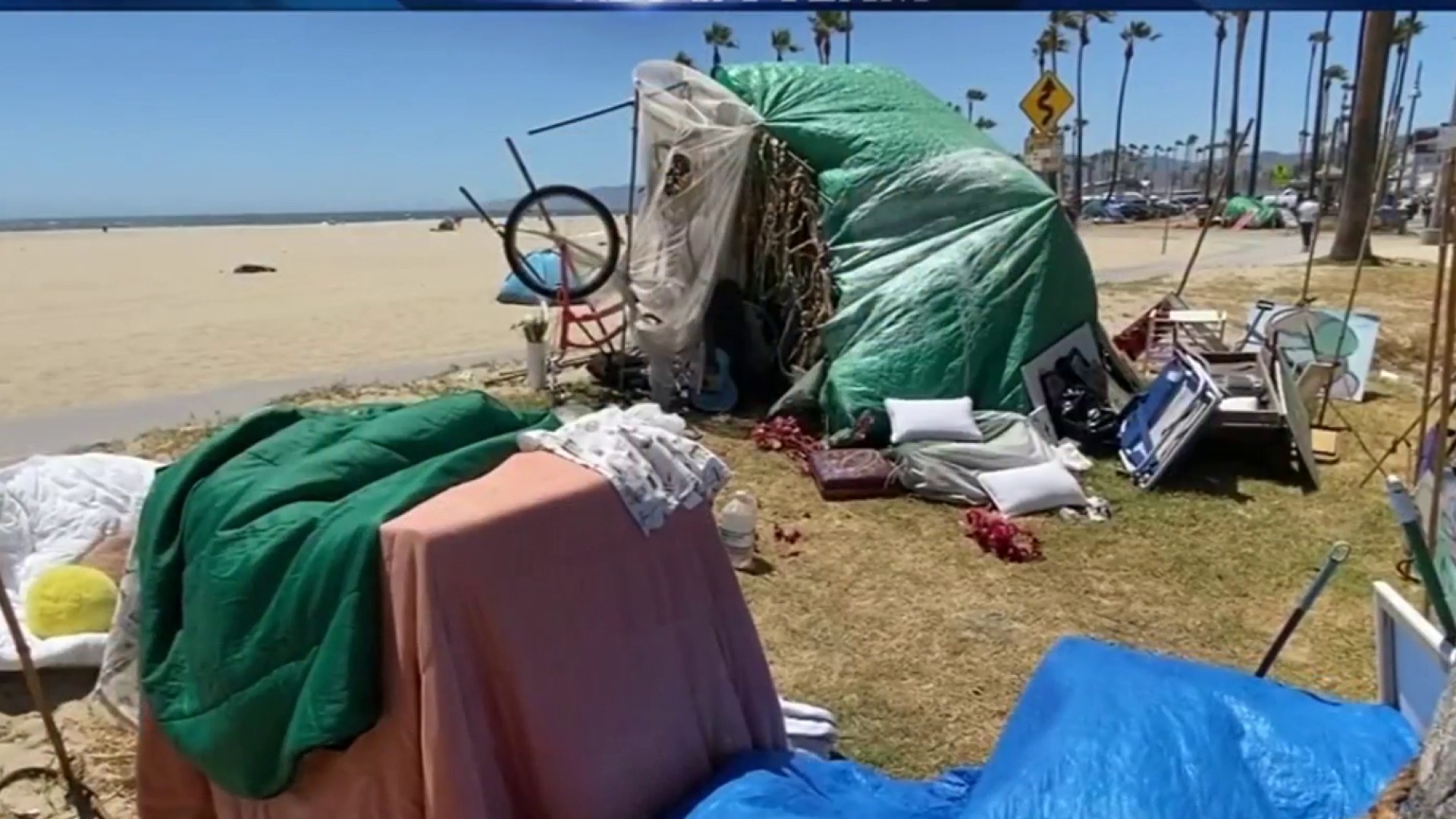There's a growing problem in the High Desert community of Landers, all too common among this region of San Bernardino County.
“As you look behind me, you see this illegal commercial cannabis grow right at the roadway,” said Erik Sundstrom, as he gestured to a fenced in operation guarded by dogs. “This isn't a secret. This is this is, ‘Hey, come and get me if you dare!’”
Apparent illegal marijuana grow sites like the one Sundstrom showed us near his property appear to operate with impunity.
Get top local stories in Southern California delivered to you every morning. Sign up for NBC LA's News Headlines newsletter.
“I'm worried about the dogs in the pot farm right next door here getting out,” said Patricia Domay, who retired to Landers five years ago. “It was peaceful out here, and I had a lot of room to garden which my passion and do my artwork.”
But in the last two years, she’s watched in horror as dozens of illegal grow sites have sprouted around her. It surprised her how quickly it happened.
“It just gave me the chills; it seems like it was almost overnight. I mean, they came, they raped the desert and they stayed!” Domay said.
Many of her neighbors are terrified of the criminal element and afraid to talk about it. But not Domay.
You know, I'm done being careful. I am done. We are going to drive these idiots out of here.
Patricia Domay, resident
The High Desert communities are pulling together to chart these illegal operations and report them to the San Bernardino County Sheriff’s Department. Neighbors learned the majority of the grows in Landers are fed by water that is actually purchased legally from the local water district.
“It's one of the things that hits you in the face as this is not right,” Sundstrom said.
In late 2019 he noticed a large marijuana operation being built next to his property, and he was shocked to see a water meter installed on what was an empty plot of land with no home.
“It did surprise me, it was astounding to me,” he said.
He realized the Bighorn Desert View Water Agency was also installing backflow devices on these properties.
"You commonly see these on fire sprinkler systems, on agricultural systems where they are using pesticides and chemicals,” he explained. They are not for a residential set up. “You wouldn't expect to see that at all.”
Sundstrom filed a series of public information requests to learn more, and found Big Horn required 115 “residential” accounts to have backflow devices, including the property next to his, a sign he says that the water agency knew the danger of what was happening on these properties and helped make their illegal operations possible.
“The water company did not have to give these meters out,” Sundstrom said. “I have not seen anything on paper that says you have to give metered water to an illegal business.”
“We did not have a practice of denying meters to landowners,” said Marina West, General Manager of the Bighorn Desert View Water Agency. “It was Eric who pointed out we had a provision in the rules. It was sort of vague, but it said we could require all necessary permits,” West explained.
So now, no new meters are going onto properties like the one near Sundstrom’s. West defends the practice of installing backflow devices to protect the water supply, but she admits removing meters already in place is a major challenge.
“I'm hoping to coordinate with law enforcement that where they intend to do an eradication. They can either get that into the search warrant to get the water off,” she said. "Or we follow back and we just have to take them one at a time, and they have to be a little pokes.”
Just two days after the NBC4 I-Team’s visit to Landers, a San Bernardino County Marijuana Enforcement team similar to one the I-Team followed a few weeks ago targeted eight locations in the Landers area. It marked week one of what the Sheriff’s Department calls “Operation Hammer Strike.” And water agency head Marina West was able to remove multiple water meters and backflow devices from these raided properties.
“I want to try to solve this problem for the community now. So that's what I'm committed to trying to do,” said West.
Neighbors like Erik Sundstrom are grateful something is finally being done.
These illegal commercial cannabis grows have brought an environmental time bomb to the desert.
Erik Sundstrom
It’s now a race against time to preserve the desert, protect its resources and drive out the criminal element that’s taken hold. Marijuana cultivation is illegal in San Bernardino County. To report a suspected grow site, call the Marijuana Enforcement Team at 909-387-8400
San Bernardino county supervisor Dawn Rowe has spearheaded the board’s effort to put stricter penalties in place. Violators can now face fines of up to $10,000 a day for repeat offenses. In the first months of Operation Hammer Strike, the San Bernardino Sheriff’s Department reports eradicating more than nearly 400 greenhouses, confiscating 77,000 marijuana plants, more than 18,000 pounds of processed cannabis, $99,000 cash and 23 firearms.




